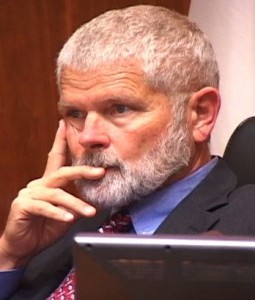Fair Political Practices Commission counsels Supervisor Bruce Gibson
April 26, 2020

Supervisor Bruce Gibson
After a lengthy investigation into an allegation San Luis Obispo County Supervisor Bruce Gibson violated conflict of interest laws, the Fair Political Practices Commission sent a letter advising Gibson he needs to update his understanding of the rules, and announcing they had closed the case.
In 2016, the SLO County Board of Supervisors approved a vacation rental exemption for a home approximately 1,200 feet away from Gibson’s primary residence in Cayucos. Without disclosing he lived nearby, Gibson argued that approval of the vacation rental permit would impact the character of the neighborhood.
In 2018, activist Julie Tacker filed a complaint alleging Gibson has violated laws requiring public officials to recuse themselves from voting on issues where the decision could influence the financial value of the official’s property.
Appearing to discount Tacker’s concerns, less than a week after she filed her complaint, Gibson voted against two vacation rental applications for properties near his home in Cayucos.
Gibson responded to the FPPC investigation that followed, by reminding the FPPC of a ruling they gave him in 2011, allowing him to vote on countywide vacation rental regulations. However, since then conflict of interest laws have changed.
Ironically, while the FPPC determined Gibson’s vote on a neighboring property’s vacation rental status had no financial impact on his property, regulators did determine Gibson appeared not to understand current requirements of the Political Reform Act.
“The Act’s conflict of interest rules and regulations have changed significantly since you last requested formal advice from the Commission’s Legal Division in 2011,” the FPPC said in a letter to Gibson. “Importantly, in 2019 the Commission adopted changes to the conflict of interest regulations.”






The comments below represent the opinion of the writer and do not represent the views or policies of CalCoastNews.com. Please address the Policies, events and arguments, not the person. Constructive debate is good; mockery, taunting, and name calling is not. Comment Guidelines